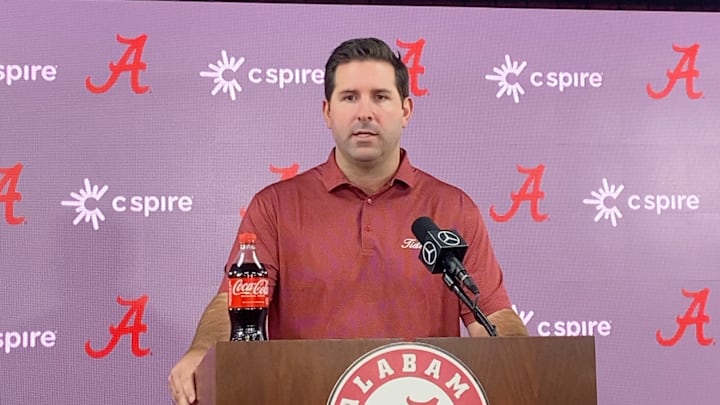Everything Alabama Offensive Coordinator Nick Sheridan Said Ahead of Vanderbilt Road Trip

The No. 1 Alabama Crimson Tide keeps its season rolling this week with an SEC road game agains the Vanderbilt Commodores. Crimson Tide offensive coordinator Nick Sheridan spent time with the media in the Naylor-Stone Media Room inside the Mal Moore Athletic facility to wrap up this past weekend's game against Georgia and set up the next game against Vanderbilt.
Full Transcript from Alabama offensive coordinator Nick Sheridan
On CJ Dippre..
"I think CJ’s size is rare. He’s a big person and I think he’s hard to tackle when he gets going. I think that showed up in the game and it has shown up throughout fall camp and spring practice. So I think he did a nice job of breaking tackles and running down hill behind his pads."
On how Jalen Milroe is throwing players open:
"We put a lot of emphasis on it. That was an area that we felt in the first few games that we could improve and we spent a lot of time collectively as a staff, just trying to simulate that as best you can in practice. And I thought all the coaches and the players did a real good job of improving in that area. Obviously, especially when you’re playing tight coverage, the location of the football matters to give our guys an opportunity to make a play and the credit, as always, goes to the players for executing in those moments. But that certainly was a point of emphasis from the coaching staff to the players that we can improve in those areas, to try to make sure that we give our guys an opportunity to make a play, and that the guys catching the ball are aware of what the quarterback is seeing and and anticipating where he might throw it as well. So that was a point of emphasis over the last few weeks and it showed up in the game. And so, there’s things that every week you look at that you can improve on and you try to address those things in the week of prep."
On Elijah Pritchett’s play:
"I thought up front, I thought the pass protection was solid, by-and-large. I thought there was times in the run game where we could do a better job, and that’s not just specifically with Pritch. I’m proud of the progress that that group has made. I’m proud of the effort, the toughness, the physicality, but I also know there’s lots for us to work on to be more consistent in certain areas. I think it’s very easy, sometimes you watch a game and maybe a player gets a penalty or something happens and you just assume that it was that person. But it’s not always the case. Sometimes somebody else has an error or a miscommunication or whatever that may be and that's where the mistake happens, but it falls on someone else’s shoulders. So I thought across the line of scrimmage, there were some good moments, for sure, in the game. And like I said, I thought the pocket was, by-and-large, pretty clean. But I thought there was things in the run game that we could do better."
On what goes into calling trick plays:
"Without going into too much detail about the thought process behind some of those plays, I think just every week, you’re trying to find ways to put your players in the best position to be successful against who they're going against, the scheme, the players, the personnel. And so, those were just plays that we felt would have a chance. Ultimately it comes down to the execution in practice to give you the confidence, whether it’s a throw, a run, a different type of play. We have all of them in our offense and I think ultimately, the execution that happens in practice gives you the confidence, not just as coaches, but as players, that you can execute those in different moments in the game. And I think there’s value in having a variety of types of plays, because it becomes harder to defend. Sometimes they work, sometimes they don’t, but I think there’s value in those. And some weeks you feel like you know you have advantages, or the looks that you’re looking for, and other weeks you don’t, so you wait for the right times and the right games to put some of those plays in."
On Ryan Williams:
"I don't think confidence was ever an issue as far as him needing that. I think he's a confident player and I think that comes from his work ethic and his preparation and how hard he practices each and every day. And I thought he played well in the game."
On running back touches and whether they need more involvement:
"You could say that's maybe a factor in it. Maybe a run in the game we felt the running backs could've read the run a little different. I thought some of the issues with some of the run game was more, we didn't block up front or communicate as well as we could have. So I don't think it was a matter of the rhythm of the running backs. I understand the question. But I thought some of the issues we had running the football was more on the communication and the fundamentals up front than it was the running backs hitting the right spot or getting into the feel of the game. We try to incorporate as many players as possible. We try to do the things that give us the best opportunity to get first downs and score points. Sometimes guys get into a rhythm and a flow. Sometimes there's a series or two where guys aren't touching the ball, and you have to stay ready and take advantage of opportunities. It's a long game. I think our guys have done a real nice job of staying locked in and focused each series, whether or not they got the ball the previous four or five plays."
On the play script:
"I think you're always balancing between trying to keep the opponent off balance by not running the same plays, and yet if you feel like it worked and there's a reason for that, to go back to them. We talked about the opening script. We repeated some of those calls, for sure. So I think you're mindful of who you're going against and the adjustments they're going to make relative to what you already had success or not with. The other piece of that is, just because a play didn't work early in the game, you have to be honest about why that did or did not happen. And not be afraid to go back to it if it was just an execution or communication issue. There are certainly times where you repeat calls or go back to a sequence of plays if you felt link they were successful. You're also trying to think ahead of what the adjustments are that they're going to make based on what you've done."
What do you see in Jalen to allow you to add diversity and wrinkles in plan:
'I think obviously it always starts with the quarterback and the things that you feel like you can do well and that particular play he didn't have a huge role in that play. He had to do his job, but I think anytime - this goes for players, this goes for units of football whether its offense or defense - I think the more you do well the harder you are to defend. The key is that you do them well and so that you execute at a high level. I think that's the challenge as a staff and as players is to try to find that sweet spot of doing the things that we can execute at a high level and then what's the level of variety that you can have to still maintain the level of execution that you're looking for, because that's when you become really tough to defend. It's like a basketball player that can only drive to the rim one way. You can tilt him that way, make him use this other hand, if he can't he can't get to the rim. In football you've got to be able to dribble with both hands, shoot from outside the three-point line and drive to the rim. You've got to have different ways to attack, different schemes, different formations, different concepts, different players and you're constantly building that as the season goes on. You know the things your opponent is preparing for. You know the things that you've shown on film and trying to anticipate and predict based on their structures and their personnel, this is what they might do based on what they've seen.
Is the sky the limit for Jalen Milroe:
I don't know that I would use those terms. I would just say that we're continuing to improve. What has happened in the past has no impact on the game this Saturday. There's no carry over, yards, points, completions. Each week in this conference and at the highest level of competition in college football, which is what we're in, it starts over. So you've got to earn it each and every week and so that's really the message and the focus for the players. We have to put a good plan in for the players, they've got to practice hard, we've got to prepare them, we've got to go execute on game day. No matter what has happened in the past and the completion percentages of previous games, good or bad, has no impact on what the game's going to look like on Saturday. It's about what you do and how well you prepare and how well you execute in those moments. Obviously, that was a good job and we needed those completions to try to find a way to go 1-0 last week, but the things that occurred last week and the plays that maybe worked last week has no impact on the team that we're going against this week. You're challenged each week in this league. Coach Lea and his staff there at Vanderbilt are some of the best defensive coaches in the country. The respect that we have for them is tremendous and so it'll be a great challenge for our players to try to execute at the best of their ability this week.
